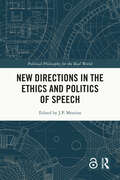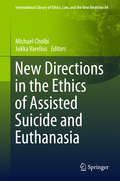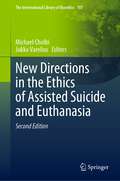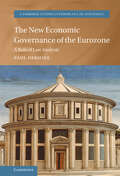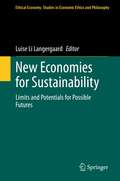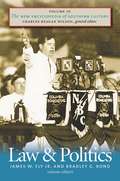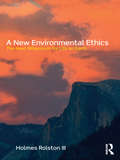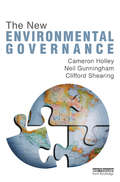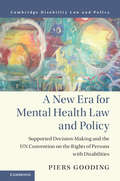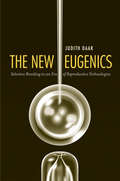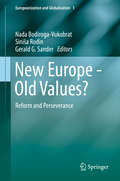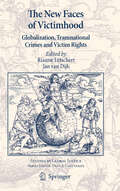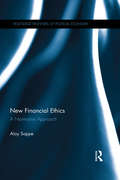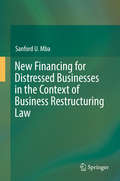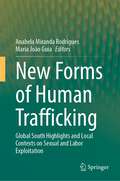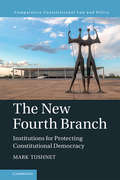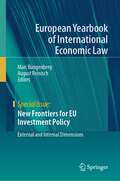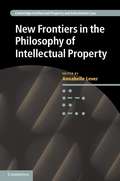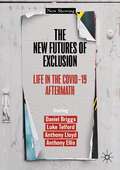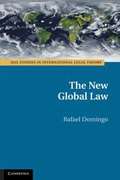- Table View
- List View
New Directions in the Ethics and Politics of Speech (Political Philosophy for the Real World)
by J. P. MessinaThis book features new perspectives on the ethics and politics of free speech. Contributors draw on insights from philosophy, psychology, political theory, journalism, literature, and history to respond to pressing problems involving free speech in liberal societies. Recent years have seen an explosion of academic interest in these topics. However, most recent work has focused on constitutional protections for free speech and on issues related to academic freedom and campus politics. The chapters in this volume set their sights more broadly on the non-state problems that we collectively face in attempting to realize a healthy environment for free discourse. The volume’s contributors share the assumption that threats to free speech do not come exclusively from state sources or bad actors, but from ordinary strategic situations in which all may be acting in good faith. Contributors take seriously the idea that our current cultural moment provides plenty of reason to be concerned about our intellectual climate and offer new insights for how to make things better. New Directions in the Ethics and Politics of Speech will be of interest to researchers and students working in ethics, political philosophy, social theory, and law. The Open Access version of this book, available at www.taylorfrancis.com, has been made available under a Creative Commons Attribution-Non Commercial-No Derivatives 4.0 license.
New Directions in the Ethics of Assisted Suicide and Euthanasia
by Michael Cholbi Jukka VareliusThis book provides novel perspectives on the ethical justifiability of assisted dying. Seeking to go beyond traditional debates on topics such as the value of human life and questions surrounding intention and causation, this volume promises to shift the terrain of the ethical debates about assisted dying. It reconsiders the role of patient autonomy and paternalistic reasons as well as the part proposed for medical professionals and clinical ethics consultation in connection with assisted dying, relates the debate on assisted dying to questions about organ-donation and developments in medical technology, and demonstrates the significance of experimental philosophy in assessing questions of assisted dying. This book is ideal for advanced courses in bioethics and health care ethics.
New Directions in the Ethics of Assisted Suicide and Euthanasia (The International Library of Bioethics #103)
by Michael Cholbi Jukka VareliusThis book provides novel perspectives on ethical justifiability of assisted dying in the revised edition of New Directions in the Ethics of Assisted Suicide and Euthanasia. Going significantly beyond traditional debates about the value of human life, the ethical significance of individual autonomy, the compatibility of assisted dying with the ethical obligations of medical professionals, and questions surrounding intention and causation, this book promises to shift the terrain of the ethical debates about assisted dying. The novel themes discussed in the revised edition include the role of markets, disability, gender, artificial intelligence, medical futility, race, and transhumanism. Ideal for advanced courses in bioethics and healthcare ethics, the book illustrates how social and technological developments will shape debates about assisted dying in the years to come.
The New Economic Governance of the Eurozone: A Rule of Law Analysis (Cambridge Studies in European Law and Policy)
by Paul DermineThe Eurozone and the European Union have recently been confronted with a number of existential threats. The sovereign debt crisis and the COVID-19 pandemic have forced European decisionmakers to pass important reforms which have radically transformed the nature and scope of the Union's powers in the field of economic and fiscal policy. As the new economic governance of the Eurozone emerges as the main driver of integration in today's Europe, this book seeks to assess the solidity of the constitutional foundations supporting that system, and its compliance with the Union's core founding value: the rule of law. Using competence allocation, regulatory quality, access to external review and fundamental rights sustainability as analytical benchmarks, this book argues that the recent metamorphosis of Eurozone economic governance has not been accompanied by a parallel strengthening of its constitutional settlement, leading to a problematic misalignment between the Union's action and its governing principles.
New Economies for Sustainability: Limits and Potentials for Possible Futures (Ethical Economy #59)
by Luise Li LangergaardThe edited volume New Economies for Sustainability: Limits and Potentials for Possible Futures brings together a range of alternative views on economy and organization to illustrate different perspectives on how to work towards more sustainable solutions to production, consumptions and economic organization more generally. The book brings chapters from the most renowned scholars in the field, who bring their perspectives on how alternative schools theorize politics, society, organization, nature and ethics in their attempts to develop theories with a strong focus on sustainability. The book aims to contribute with a platform for gathering and collecting these theories in a pluralist economic framework, which can provide a strong alternative voice to mainstream economic theories in sustainability debates.
The New Encyclopedia of Southern Culture: Law and Politics
by James W. Ely Bradley G. BondVolume 10 of The New Encyclopedia of Southern Culture combines two of the sections from the original edition, adding extensive updates and 53 entirely new articles. In the law section of this volume, 16 longer essays address broad concepts ranging from law schools to family law, from labor relations to school prayer. The 43 topical entries focus on specific legal cases and individuals, including historical legal professionals, parties from landmark cases, and even the fictional character Atticus Finch, highlighting the roles these individuals have played in shaping the identity of the region. The politics section includes 34 essays on matters such as Reconstruction, social class and politics, and immigration policy. New essays reflect the changing nature of southern politics, away from the one-party system long known as the "solid South" to the lively two-party politics now in play in the region. Seventy shorter topical entries cover individual politicians, political thinkers, and activists who have made significant contributions to the shaping of southern politics.
A New England Prison Diary: Slander, Religion, and Markets in Early America
by Martin J. HershockIn 1812, New Hampshire shopkeeper Timothy M. Joy abandoned his young family, fleeing the creditors who threatened to imprison him. Within days, he found himself in a Massachusetts jailhouse, charged with defamation of a prominent politician. During the months of his incarceration, Joy kept a remarkable journal that recounts his personal, anguished path toward spiritual redemption. Martin J. Hershock situates Joy's account in the context of the pugnacious politics of the early republic, giving context to a common citizen's perspective on partisanship and the fate of an unfortunate shopkeeper swept along in the transition to market capitalism. In addition to this close-up view of an ordinary person's experience of a transformative period, Hershock reflects on his own work as a historian. In the final chapter, he discusses the value of diaries as historical sources, the choices he made in telling Joy's story, alternative interpretations of the diary, and other contexts in which he might have placed Joy's experiences. The appendix reproduces Joy's original journal so that readers can develop their own skills using a primary source.
The New Entrants Problem in International Fisheries Law
by Andrew SerdyAre international fisheries heading away from open access to a global commons towards a regime of property rights? The distributional implications of denying access to newcomers and re-entrants that used the resource in the past are fraught. Should the winners in this process compensate the losers and, if so, how? Regional Fisheries Management Organisations, in whose gift participatory rights increasingly lie, are perceptibly shifting their attention to this approach, which has hitherto been little analysed; this book provides a review of the practice of these bodies and the States that are their members. The recently favoured response of governments, combating 'IUU' - illegal, unregulated and unreported - fishing, is shown to rest on a flawed concept, and the solution might lie less in law than in legal policy: compulsory dispute settlement to moderate their claims and an expansion of the possibilities of trading of quotas to make solving the global overcapacity issue easier.
A New Environmental Ethics: The Next Millennium for Life on Earth
by Holmes Rolston IIINo one looking ahead at the middle of the last century could have foreseen the extent and the importance of the ensuing environmental crises. Now, more than a decade into the next century, no one can ignore it. A New Environmental Ethics: the Next Millennium for Life on Earth offers clear, powerful, and oftentimes moving thoughts from one of the first and most respected philosophers to write on the environment. Rolston, an early and leading pioneer in studying the moral relationship between humans and the earth, surveys the full spectrum of approaches in the field of environmental ethics. This book, however, is not simply a judicious overview. Instead, it offers critical assessments of contemporary academic accounts and draws on a lifetime of research and experience to suggest an outlook for the future. As a result, this focused, forward-looking analysis will be a necessary complement to any balanced textbook or anthology in environmental ethics, and will teach its readers to be responsible global citizens, and residents of their landscape, helping ensure that the future we have will be the one we wish for.
A New Environmental Ethics: The Next Millennium for Life on Earth
by Holmes Rolston IIIThis Second Edition of A New Environmental Ethics: The Next Millennium for Life on Earth offers clear, powerful, and often moving thoughts from Holmes Rolston III, one of the first and most respected philosophers to write on the environment and often called the "father of environmental ethics." Rolston surveys the full spectrum of approaches in the field of environmental ethics and offers critical assessments of contemporary academic accounts. He draws on a lifetime of research and experience to suggest an outlook, and even hope, for the future. This forward-looking analysis, focused on the new millennium, will be a necessary complement to any balanced textbook or anthology in environmental ethics. The First Edition guaranteed "to put you in your place." Beyond that, the Second Edition asks whether you want to live a "de-natured life on a de-natured planet." Key Updates in the Second Edition Covers the worsening environmental situation due to actions of the Trump administration, including withdrawal from the Paris Agreement and from the U.N. Framework Convention on Climate Change Includes information on legislation in key U.S. states (e.g., California and New York) aimed to ameliorate the damage done at the federal level Increases coverage of group knowledge, group agreement and disagreement, and group action in collective environmental ethics, as distinguished from individual knowledge and action Examines the deleterious effects of online consumer behavior Explains how a loss of solidarity among a nation’s citizens and even a larger solidary among humanity leads to environmental degradation Offers new analysis of the effects of epistemic bubbles, echo chambers, and fake news on the behavior of voters and consumers Provides an extended critique of the Anthropocene Epoch, and the prospect of geo-engineering Earth to become a synthetic environment.
The New Environmental Governance
by Cameron Holley Neil Gunningham Clifford ShearingA bold and profoundly new way of governing environmental problems is palpable around the globe and aims to overcome the limitations of the interventionist state and its market alternative to offer more effective and legitimate solutions to today's most pressing environmental problems. The 'new environmental governance' (NEG) emphasises a host of novel characteristics including participation, collaboration, deliberation, learning and adaptation and 'new' forms of accountability. While these unique features have generated significant praise from legal and governance scholars, there have been very few systematic evaluations of NEG in practice, and it is still unclear whether NEG will in fact 'work', and if so, when and how. This book offers one of the most rigorous research investigations into cutting edge trends in environmental governance to date. Focusing its inquiry around some of the most central, controversial and/or under researched characteristics of NEG, the book offers fresh insights into the conditions under which we can best achieve successful collaboration, effective learning and adaptation, meaningful participatory and deliberative governance and effective forms of accountability. The book synthesizes its findings to identify seven key pillars of 'good' NEG that are central to its success and will provide useful guidance for policymakers and scholars seeking to apply new governance to a wide range of environmental and non-environmental policy contexts. The book also advances our understanding of State governance and will be a valuable reference for scholars, researchers and students working in law and regulation studies - especially in the field of environmental law.
A New Era for Mental Health Law and Policy: Supported Decision-Making and the UN Convention on the Rights of Persons with Disabilities (Cambridge Disability Law and Policy Series)
by Piers GoodingThe Convention on the Rights of Persons with Disabilities (CRPD) has generated new ideas and standards in healthcare and disability law and policy. In the mental health context, the CRPD directs governments to ensure people with mental impairments are treated equally before the law, including ensuring people have access to the resources necessary to enjoy their rights. But what this means in practice remains unclear. In addition, current domestic laws that authorise involuntary psychiatric interventions stand at cross-purposes with the CRPD, which requires respect for the 'will, preference and rights' of persons with disabilities 'on an equal basis with others'. This book explores the implications of the CRPD for law, policy and practice that responds to the complex issues raised by mental health impairment and disability. It argues that the support framework of the CRPD holds potential to address persistent shortcomings in mental health law and policy. Proposes a new approach to mental health and the law Promotes the application of international human rights law to mental health law, policy and practice Considers new solutions to longstanding problems regarding coercive mental health treatment
The New Eugenics: Selective Breeding in an Era of Reproductive Technologies
by Prof. Judith DaarA provocative examination of how unequal access to reproductive technology replays the sins of the eugenics movement Eugenics, the effort to improve the human species by inhibiting reproduction of "inferior" genetic strains, ultimately came to be regarded as the great shame of the Progressive movement. Judith Daar, a prominent expert on the intersection of law and medicine, argues that current attitudes toward the potential users of modern assisted reproductive technologies threaten to replicate eugenics' same discriminatory practices. In this book, Daar asserts how barriers that block certain people's access to reproductive technologies are often founded on biases rooted in notions of class, race, and marital status. As a result, poor, minority, unmarried, disabled, and LGBT individuals are denied technologies available to well-off nonminority heterosexual applicants. An original argument on a highly emotional and important issue, this work offers a surprising departure from more familiar arguments on the issue as it warns physicians, government agencies, and the general public against repeating the mistakes of the past.
New Europe - Old Values?
by Nada Bodiroga-Vukobrat Siniša Rodin Gerald SanderThis book explores the reactions to Europeanization and globalization in times of economic distress, including the transformation of European values in national legal cultures. The authors explore how European values, tradition and new legal challenges interconnect and dictate the paths of transition between old and new Europe. The first chapter starts with a question: can Roman Legal Tradition play a role of identity factor towards a New Europe? Can it be considered as a general value identifying new Europe, built on a minimum core of principles - persona, dominum, obligation, contract and inheritance - composing the whole European private law tradition? Subsequent chapters attempt to provide possible responses to the question: what is Europe today? The answers diverge, depending on the research area. The inherent dichotomy of human rights protection in Europe and the concept of 'one law, one court' are investigated in the second chapter, whereas the third chapter focuses on asylum and the interrelation and interdependence of the Court of Justice of the EU and the European Court of Human Rights. The next three chapters concentrate on matters of equal treatment and non-discrimination. The first contribution in this part reflects on the crisis and methodological and conceptual issues faced by modern anti-discrimination law. It is followed by a specific analysis of the empowerment of women or gender-balancing in company boards. The third contribution reveals the impact of the Croatian anti-discrimination law on private law relations. The next chapter deals with the issue of social rights in Croatia and the method of their regulation in the context of the new European values. The immense challenges posed by the market integration imperative and democratic transition have brought about different reactions in the national legal systems and legal cultures of both old and new Member States. As such, Europe has effectively been reunited, but what about the convergence of national legal cultures? This is the focal point of the remaining chapters, which focus on various issues, from internal market, competition law, consumer welfare, liberalization of network industries to the EU capital market. The magnitude of EU activity in these areas offers conclusive evidence that old and new paradigms are evolving and shaping the future of the EU.
The New Faces of Victimhood
by Jan Van Dijk Rianne LetschertBesides generating wealth, globalization makes victims, including victims of new forms of crime. In this edited book of scholarly essays, international lawyers and criminologists reflect on the legal challenges posed by these dark sides of globalization. Examples include transnational organised crime, human trafficking and corruption, cyber crimes, international terrorism, global corporate crime and cross-border environmental crimes. The authors reflect on the limits of domestic systems of justice in providing protection, empowerment and redress to the victims of these emerging forms of global insecurity. They argue for the need of better international or supra-national institutional arrangements such as legal instruments and actions of the United Nations or regional organizations such as the European Union. In part I Jan Van Dijk and Rianne Letschert present an overview of trends in criminal victimization against the backdrop of globalization using a unique set of statistical indicators. By placing this issue in the framework of the human security concept, the authors draw out its broader political and normative implications. Theologist Ralf Bodelier explains how modern communication technologies have heightened sensitivities among the general public for human insecurities anywhere in the world. In his view, a new global conscience is in the making that may become the cornerstone of international solidarity and action. Marc Groenhuijsen and Rianne Letschert describe the emergence of national and international legal and institutional arrangements to offer remedies to victims of crime in an era of globalization. In part II a selection of experts analyse the specific issues surrounding the protection and empowerment of victims of different types of international crimes such as human trafficking, organised crime/corruption, terrorism, global corporate crime and cross border environmental crimes. In part III focused attention is given to the special challenges and opportunities of protecting and assisting crime victims in cyberspace. Part IV deals with emerging victim issues in humanitarian law such as the accountability of private military companies and the implementation of the ambitious victim provisions in the statute of the International Criminal Court including the establishment of a global fund for reparations. In the final part of the book some of its core authors formulate their ideas about the international institutional arrangements that should be put in place to offer justice to the victims of globalization. A concrete proposal is made for the transformation of the United Nations 1985 Declaration on the Principles of Justice for Victims of Crime and Abuse of Power into a full-fledged UN convention. In the final chapter further proposals are made for the increased involvement of regional organisations such as the European Union in the protection of victims of global crime.
New Financial Ethics: A Normative Approach (Routledge Frontiers of Political Economy)
by Aloy SoppeFollowing the internationalisation, globalisation and deregulation of the financial market over the last few decades, the financial sector has evolved from a servicing industry into an initiating and leading sector in the international industrialised economy. The power of the financial sector, including Credit Rating Agencies, determines the creditworthiness of companies and countries. Today’s financial sector dominates instead of serving the real economy, which puts substantial pres - sure on all the agencies involved, not least the banks, to make the profits that will drive economic growth. As a result of this pressure, moral conduct in the financial sector has been put under severe strain. This book examines the experience of the recent financial crisis and argues that a firmer ethical grounding for the financial sector is required to prevent the crisis being repeated. The book offers a model for making judgements on financial markets, institutions and products. The model is built on seven major criteria which are examined in depth: Justice, Nature, Sustainability, Legality, Risk and Return, the Stakeholder model and Monism. This multidisciplinary approach integrates philosophy, economics and law to arrive at a new normative approach to financial ethics. This book is a must-read for finance students at academic levels but also for professionals in the financial sector, who can be helped by implementing the model of NFE in solving financial dilemmas.
New Financing for Distressed Businesses in the Context of Business Restructuring Law
by Sanford U. MbaThis book focuses on the restructuring of distressed businesses, emphasizing the need for new financing during the restructuring process as well as during relaunch, and examines the role of law in encouraging creditor confidence and incentivizing lending. It describes two broad approaches to encouraging new finance during restructuring: a prescriptive one that seeks to attract credit using expressly defined statutory incentives, and a market-based one that relies on the business judgment of lenders against the backdrop of transaction avoidance rules.Securing new financing for a distressed business is a critical part of successful restructuring. Without such financing, the business may be unable to meet interim liquidity constraints, or to implement its restructuring plans. This book addresses related questions concerning the place of new financing as an essential component of restructuring.In general terms, the book explores how statutory interventions and the courts can provide support with contentious issues that arise from the provision of new financing, whether through new financing agreements or through distressed debt investors, who are increasingly gaining prominence as sources of new financing for distressed businesses. It argues that courts play a key part in preventing or correcting the imbalances that can arise from the participation of distressed debt investors. In this context, it critically examines the distressed debt market in emerging markets like Nigeria and the opportunity presented by non-performing loans, arguing that the regulatory pattern of market entry may dis-incentivize distress debt investing in a market that is in dire need of financing. The book offers a fresh and comparative perspective on restructuring new financing for distressed businesses by comparing various approaches (primarily from the US, UK and Germany) and drawing lessons for frontier markets, with particular reference to Nigeria. It fills an important gap in international comparative scholarship and discusses a living problem with both empirical and policy aspects.
New Forms of Human Trafficking: Global South Highlights and Local Contexts on Sexual and Labor Exploitation
by Anabela Miranda Rodrigues Maria João GuiaThis book analyses new forms of human trafficking taking into account the transposition of the Directive 2011/36/UE which sets out minimum standards to be applied throughout the European Union in preventing and combating trafficking in human beings and protecting its victims. Sexual exploitation of trafficked persons is at its highest rate. After COVID-19, new forms of sexual exploitation have been identified, specifically in the Global South. The book analyses new forms of exploitation used by traffickers to coerce victims. Combining the perspectives of academic researchers with those of highly skilled professionals from governmental institutions, this book is a unique contribution, promoting collaboration in preventing and combating human trafficking crime, and in raising awareness of this ongoing problem.
The New Fourth Branch: Institutions for Protecting Constitutional Democracy (Comparative Constitutional Law and Policy)
by Mark TushnetTwenty-first-century constitutions now typically include a new 'fourth branch' of government, a group of institutions charged with protecting constitutional democracy, including electoral management bodies, anticorruption agencies, and ombuds offices. This book offers the first general theory of the fourth branch; in a world where governance is exercised through political parties, we cannot be confident that the traditional three branches are enough to preserve constitutional democracy. The fourth branch institutions can, by concentrating within themselves distinctive forms of expertise, deploy that expertise more effectively than the traditional branches are capable of doing. However, several case studies of anticorruption efforts, electoral management bodies, and audit bureaus show that the fourth branch institutions do not always succeed in protecting constitutional democracy, and indeed sometimes undermine it. The book concludes with some cautionary notes about placing too much hope in these – or, indeed, in any – institutions as the guarantors of constitutional democracy.
New Frontiers for EU Investment Policy: External and Internal Dimensions (European Yearbook of International Economic Law)
by Marc Bungenberg August ReinischWith the entry into force of the Treaty of Lisbon in 2009, the EU became a global actor in the field of foreign direct investment. Since then, the field of EU investment policy has been gradually shaped by numerous political changes, judgments and opinions delivered by the Court of Justice of the EU, as well as lively scholarly debate. Today, a clear division between the “internal” and “external” dimensions of EU investment policy has emerged, which constitutes the general topic of this book. Within these dimensions, additional – and sometimes contradictory – facets of the EU’s multi-layered approach to investment protection can be identified. On the one hand, EU investment policy is shifting toward a decentral approach when it comes to substantive standards of investment protection. On the other hand, the EU is following a multilateral approach with regard to procedural innovations in investor-State dispute settlement.In this EYIEL Special Issue, leading experts in the field discuss the latest developments with regard to the above-mentioned dimensions and facets, which reflect new trends and challenges for EU investment policy. Among others, the book discusses the EU’s participation in the reform process for the international investment regime, the emergence of central planning and decentral implementation of EU investment policy, the feasibility of an intra-EU investment court, the protection and enforcement of investment standards under EU law, and the suitability of mediation as an alternative to intra-EU investment arbitration.
New Frontiers in the Philosophy of Intellectual Property
by Annabelle LeverAre intellectual property rights a threat to autonomy, global justice, indigenous rights, access to lifesaving knowledge and medicines? The essays in this volume examine the justification of patents, copyrights and trademarks in light of the political and moral controversy over TRIPS (the Agreement on Trade-Related Aspects of Intellectual Property Rights). Written by a distinguished international group of experts, this book draws on the latest philosophical work on autonomy, equality, property ownership and human rights in order to explore the moral, political and economic implications of property rights in ideas. Written with an interdisciplinary audience in mind, these essays introduce readers to the latest debates in the philosophy of intellectual property, whether their interests are in the restrictions that copyright places on the reproduction of music and printed words or in the morality and legality of patenting human genes, essential medicines or traditional knowledge.
The New Futures of Exclusion: Life in the Covid-19 Aftermath
by Daniel Briggs Luke Telford Anthony Lloyd Anthony EllisBased upon global data and following on from Lockdown: Social Harm in the COVID-19 Era, this book discusses the rise of surveillance capitalism and new forms of control and exclusion throughout the Covid-19 pandemic. It particularly addresses the use of vaccine passports, mandates and the new forms of capital extraction and political control that emerged throughout the pandemic. The book also explicates how the ‘vaccine hesitant’ became marginalized in both mainstream discourse and through regulatory interventions. Whilst the book addresses the wider political economy within which so-called ‘anti-vaxxers’ were ostracized, it also explores the complex nature of their sentiments. The book closes by considering The New Futures of Exclusion, outlining the forms of surveillance and control that may be implemented in the future particularly in light of the challenges brought by global warming and the energy transition. It is a broadly accessible text, particularly appealing to policymakers, general readers and academics in sociology, political sociology, politics, human geography, political economy, criminology, social policy, psychology, history, and infectious diseases and medicine.
New Ghosts, Old Ghosts: Prisons and Labor Reform Camps in China (Socialism And Social Movements Ser.)
by James D. Seymour Michael R AndersonMuch has been written about the laogai (sometimes likened to the Soviet gulag) in the People's Republic of China. Depending on the source, the prisons are described as nonexistent, enlightened institutions, or hellish places that subject the inmates to degradation and misery. The system is commonly thought of (by admirers and critics alike) as having a measurable impact on the national economy and providing significant resources to the state. Based on research in classified documents and extensive interviews with former prisoners, judicial personnel, and other insiders, and featuring case studies dealing with the three northwestern provinces, this book examines such assertions on the basis of the facts about this underexamined subject in order to arrive at a detailed, objective, and realistic picture of the situation. In the case of each province under study, the authors discuss the history of the provincial prison system and the impact that each has had at the macro, meso, and micro levels.
The New Global Law
by Rafael DomingoThe purpose of this book series is to clarify and improve the theoretical foundations of international law. Too often the progressive development and implementation of international law have foundered on confusion about first principles. This series will raise the level of public and scholarly discussion about the structure and purpose of the world legal order and how best to achieve global justice through law.
The New Gold Rush: The Riches of Space Beckon!
by Joseph N. PeltonThis book captures the most exciting advances in the harnessing of space as a global resource. The authors track the growing number of space businesses and opportunities for investors, and the many possible benefits of spaceplanes, space stations and even space colonies. The authors also discuss the need for more regulatory reform. Companies like Planetary Resources are now forming to find mineral-rich asteroids and bring back new riches to Earth. Solar power satellites in the next few years will start to beam clean energy back to Earth, to meet the growing demands of a still-developing world. Innovative space industries are vital to the survival of modern human life, and the authors demonstrate what can be done to encourage the growing of the "New Space" frontier. From lassoing and then mining asteroids to developing new methods of defending the planet from space hazards and setting up new hotels and adventures for tourists in space, this new industry will have profound effects on Earth, especially on its economy. This book is based on a study of international experts commissioned ahead of the UNISPACE+50 meeting, having distilled the results of this comprehensive fact-finding process into a compact and very readable form. It can serve as an excellent starting point for understanding all the activities underway or planned to make space truly our next frontier.
